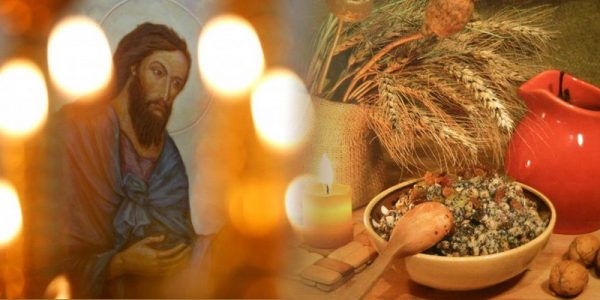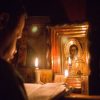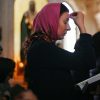The Reading from the Holy Gospel according to St. Luke. (15:11-32)
Today we continue our march towards Great and Holy Lent which will begin on March 15th. Each and every gospel reading during the period preceding the start of Lent is meant to prepare us and to inspire us to prepare for this serious and somber time of spiritual struggle leading to healing and restoration. The teaching of the Church is that restoration and revival come first through repentance and this is followed by ascetic struggle. According to St. Basil the great, “Fasting was ordained in Paradise. The first injunction was delivered to Adam, ‘Of the tree of the knowledge of good and evil you shall not eat.’ ‘You shall not eat’ is a law of fasting and abstinence.” Adam and Eve fell through the desires of their will and the persuasion of their stomachs. They ate and found bitterness, corruption and death in their rebellion from God.
Yet, through our willful choice to endure hardships and deprivation and to bring the body into subjection to the mind and heart through ascetic disciplines like fasting and increasing our physical prayer routine with prostrations and coming to the church more often for increased prayers together, we melt away the stony and rocky exterior of the heart and the grace of the Holy Spirit can then punch through the walls that have been created by our life of sinful rebellion. We weaken the defenses of the flesh and the Holy Spirit can then overcome us with His mercy and healing. As St. Paul writes “But I discipline my body and bring it into subjection, lest, when I have preached to others, I myself should become disqualified.” (1 Cor 9:27)
Great and Holy Lent was instituted for the whole Church very early on in history. We have a mention in canons of the great council at Nicaea which was held in 325. AD. This time of fasting was particularly important to prepare all of the pagans and unbelievers who would be baptized and accepted as members of the Holy Church on Great and Holy Saturday, the day before Easter, as is our custom to this day. The fasting for 40 days is found all over the Bible, but some examples are Moses on Mt. Sinai for 40 days without food, and our Lord Jesus Christ fasting in the wilderness for 40 days. To this 40 days we also add the days of preparation, called cheese fare week. During that week we remove meat from our diets but continue with eating other animal products such as dairy and eggs. In addition after the 40 days of fasting we have the busiest week in the liturgical life of the Church which is Holy Week. This week is technically not part of lent, rather it is like “a lent within a lent.”
Contrary to popular belief, the fasting of lent is not limited to removing certain foods. It also assumes reducing the amount that you eat. This can be achieved in a number of ways. For some it will mean cutting back on your portions and getting up from the table while you are still not quite full. While for others it will mean cutting down on the number of meals you eat. All of these questions can be discussed with your spiritual father or priest.
These fasting rules and disciplines as we mentioned last week when we spoke of the Publican and the Pharisee, do not save us. They are a tool for our salvation. St. Seraphim of Sarov writes,
“Fasting, prayer, alms, and every other good Christian deed is good in itself, but the purpose of the Christian life consists not only in the fulfillment of one or another of them. The true purpose of our Christian life is the acquisition of the Holy Spirit of God. But fasting, prayer, alms and every good deed done for the sake of Christ is a means to the attainment of the Holy Spirit.”
Once I was asked if it is a sin not to fast. I think the important question is really “If the Church is truly the body of Christ and I desire to be healed and saved, why would I reject the life giving disciplines that the Church is trying to share with me?” It is certainly a sin to reject the life giving medicines that the Church, which St. Paul calls “the pillar and foundation of truth” has passed down to us.
Listen to the words of St. John Chrysostom on fasting. He writes “Fasting is wonderful, because it tramples our sins like a dirty weed.” But he also tells us that the acceptable fast is not merely the fasting from food but the fasting from evil through the proper use of our God given senses. He writes,
“For the value of fasting consists not in abstinence from food, but in withdrawing from sinful practices…Do you fast? Give me proof of it by your works! Is it said by what kind of works? If you see a poor man, take pity on him! If you see in enemy, be reconciled to him! If you see a friend gaining honor, envy him not! If you see a beautiful woman, pass her by! For let not the mouth only fast, but also the eye, and the ear, and the feet, and the hands, and all the members of our bodies.
Let the hands fast, by being pure from theft and greed. Let the feet fast, by ceasing from running to the unlawful spectacles (by the way, this mean we need to stop watching filth on the tv and the internet). Let the eyes fast, being taught never to fix themselves rudely upon handsome (or beautiful) countenances…For looking is the food of the eyes, but if it is unlawful or forbidden, it mars the fast; and upsets the whole safety of the soul… Let the ear fast also. The fasting of the ear consists in refusing to receive evil speakings and false accusations (gossip). Let the mouth too fast from disgraceful speech and railing. For what does it profit if we abstain from birds and fish; and yet bite and devour our brethren?” (Homily 3, On the Statues)
So in all this we see that the Church understands fasting in a holistic way. Each one of us starts the fast in the place of the prodigal son. We are alienated from God in some ways and we’ve squandered our inheritance as God’s children. Let us also use this coming time of Lent to be like the prodigal and come to our senses and run back to our heavenly Father who is waiting to embrace each of us and restore us to newness of life. Glory be to God forever AMEN.

















